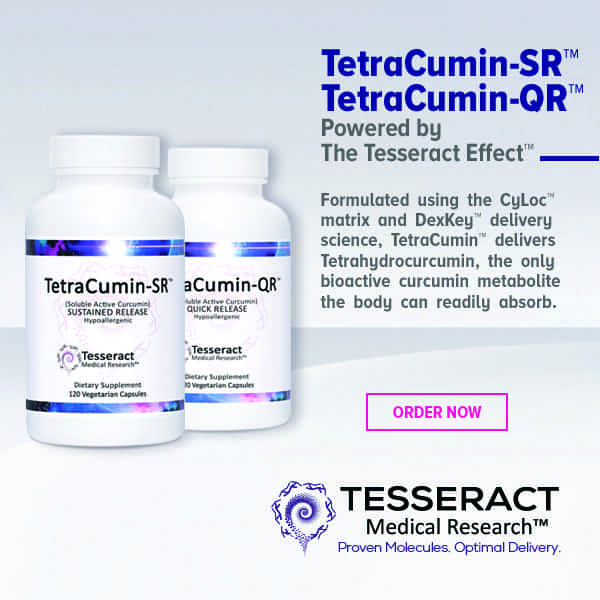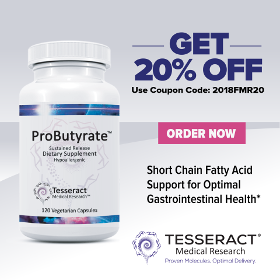Article Summary:
- Many patients with ulcerative colitis fail to fully respond to medication or experience disruptive side effects from medications but are unable to reduce their dose for fear of flare-ups
- Natural anti-inflammatories such as berberine, curcumin, and butyric acid could help patients reduce ulcerative colitis symptoms or maintain remission when medication dosage is decreased
- Advanced new formulations are allowing patients with ulcerative colitis to benefit from anti-inflammatory supplements that may have previously presented absorption challenges
Inflammation of the colon is an unpleasant fact of life for patients with ulcerative colitis and others who struggle with inflammatory bowel diseases. As a result of currently unknown forces within the body, ulcerative colitis leads patients to experience a medley of pain and swelling which can result in unintentionally losing weight, rectal bleeding, and feeling faint. If left untreated, ulcerative colitis often leads to inflammation of the liver or even colon cancer. As such, gaining control of symptoms is essential for not only short-term comfort, but also for long-term health.
To address ulcerative colitis symptoms, patients often turn to medications like anti-inflammatories, immunosuppressants, and TNFa inhibitors with varying levels of success. In severe circumstances, such as during an inflammatory flare-up, patients may need to be hospitalized to receive infusions of immunosuppressive drugs on a regular basis or surgically remove portions of their colon.1 While surgery may be curative, many patients don’t experience symptoms with the frequency or severity necessary to qualify for such intervention, leading to prolonged low to moderate-grade symptoms that must be managed on an ongoing basis.
Unfortunately, those patients who can control their symptoms with the help of medications often struggle with side effects ranging from diarrhea to low white blood cell count. This means that many patients stand to benefit from reducing the dose of their medication, but are unable to without increasing their risk of experiencing flare-ups. As such, patients with controlled ulcerative colitis who are struggling with the side effects of their medications may want to integrate alternative treatments to ensure that their symptoms remain in remission as they decrease their dosage. For patients who can’t fully control their ulcerative colitis with medication, the need for alternative treatment is even greater, as pharmaceutical therapies have failed to produce adequate symptom relief. For both types of patients, augmenting conventional treatment with natural anti-inflammatories for ulcerative colitis—particularly berberine, curcumin, and butyric acid—could have significant benefits.
Berberine
A growing body of evidence suggests that berberine may be a potent tool for patients with ulcerative colitis who are seeking a natural adjunct therapy for inflammation. Berberine is extracted from several different plants, the most common of which being the barberry bush, and was used in Chinese traditional medicine. Now, the medical community has started to show increasing interest in using berberine to treat inflammatory diseases like ulcerative colitis due to its anti-inflammatory properties.
Evidence suggests that berberine has the potential to benefit patients with ulcerative colitis in a variety of ways. Researchers have found that it may be a useful adjunct to maintenance therapy with prescribed anti-inflammatories, helping patients avoid inflammatory flare-ups.2 Additionally, it may help untreated patients to experience fewer relapses—a critical factor for patients who have their disease mostly under control without medication.3
Berberine exhibits its anti-inflammatory and pro-remission effects via a non-traditional mechanism. More specifically, it reduces the efficiency of the mitochondria of the white blood cells of the colon. In the cell, the mitochondria are the organelles which are responsible for manufacturing the chemical energy the cell needs to fulfill its role in the body. Reducing the efficiency of the mitochondrial production of this chemical energy decreases the amount of circulating chemical energy and leads to less activity in the cell. While completely stopping all of the body’s mitochondria would be fatal, turning down the efficiency of the mitochondria in the white blood cells of the colon means that these cells can’t generate inflammation as effectively. The potential benefits to patients with ulcerative colitis may be substantial.
In a 2018 study conducted using ulcerative colitis model mice, researchers administered berberine to one group of 10 ulcerative colitis mice and administered a placebo to another equally-sized group.4 A third group of mice without ulcerative colitis was also examined as a control. The researchers found that the ulcerative colitis mice who received berberine were much healthier than those who didn’t, exhibiting less distress and fewer signs of damage to their intestinal tissues.
To grade the impact of berberine on the mice, researchers used an ulcerative colitis disease activity index, which is a four-point scale that researchers grade based on subjective appraisals of the mouse’s aggregate gastrointestinal symptoms; a zero indicates being free of any ulcerative colitis symptoms, and a four indicates a severe and overwhelming outbreak of symptoms. The mice who didn’t receive berberine exhibited between a 3.7 and 2.2 on the scale, whereas the mice whose diets were supplemented with berberine exhibited between 1.9 and 1.2. Berberine caused the mice to experience on average a 1.5-point reduction in their ulcerative colitis disease activity index. Upon examining tissue sections extracted from the mice, researchers concluded that mice who had received berberine exhibited up to 40% less inflamed tissue surface area. While these results remain to be confirmed in humans, positive anecdotal reports by patients suggest that confirmation is only a matter of time. Furthermore, the animal model evidence is clear: berberine reduces the inflammation associated with ulcerative colitis.
Curcumin
The plant-derived molecule curcumin may also be a useful anti-inflammatory for the maintenance of remission in ulcerative colitis.5 Curcumin is isolated from the turmeric root, which has been used as a spice and Ayurvedic medicinal remedy for thousands of years. As a result of its ability to increase the potency of standard ulcerative colitis therapies like mesalazine, curcumin is of particular interest to patients who need their medications to perform better while maintaining remission. Curcumin may also help patients reduce the level of medication necessary to maintain remission, allowing them to experience fewer side effects as a result of a smaller dose.In a 2015 clinical trial of 50 ulcerative colitis patients taking mesalazine yet still experiencing moderate levels of inflammation, patients who were taking both mesalazine and curcumin entered remission faster and subsequently recovered more rapidly than patients who were taking mesalazine and a placebo.6 All of the patients were taking the maximum dose of mesalazine, meaning that all of the patients in the study required an escalation of their therapy. Curcumin appeared to curb the need for escalation by controlling inflammation when administered in conjunction with mesalazine.
Within four weeks, 53.8% of patients taking curcumin and mesalazine in the trial entered remission. In comparison, none of the patients taking mesalazine and a placebo concluded their inflammatory episodes within four weeks, meaning that they were forced to escalate their treatment and begin to take more powerful anti-inflammatories, move on to other forms of pharmaceutical treatment, or potentially undergo surgery. Additionally, 38% of the patients in the study who received curcumin showed no signs of active ulcerative colitis investigation with an endoscopy, but none of the patients taking a placebo with their mesalazine met the same criteria. In total, 65.3% of patients receiving curcumin exhibited a clinical response, meaning that even if taking curcumin didn’t drive their inflammation into remission, it still helped patients to feel better. No patients reported adverse events or side effects associated with curcumin.
Significantly, these results echo the findings of previous studies, a powerful signal that patients with ulcerative colitis can benefit from taking curcumin alongside their prescribed treatment.7 However, scientists have some important research to perform: currently, the mechanism of curcumin’s impact on mesalazine and inflammation is not modeled or understood in any capacity. Subsequent investigations will help to further develop curcumin into a therapy which patients can take advantage of and have confidence in.
Butyric Acid
For many in the medical community, using the body’s built-in anti-inflammatories is a compelling approach to reducing the inflammatory load of patients with ulcerative colitis. In this vein, butyric acid may be one of the most effective anti-inflammatories for the gastrointestinal tract. Butyric acid is a short-chain fatty acid produced by the body for the purposes of regulating the immune system of the gut and providing an energy source to the cells and microbiota which dwell there. In its capacity as an immunoregulator, butyric acid suppresses the secretion of proinflammatory molecules by white blood cells while also prompting the secretion of other anti-inflammatory molecules. Thus, butyric acid is a potent anti-inflammatory. Due to this anti-inflammatory action, butyric acid enemas have been proposed as a potential therapy for patients with ulcerative colitis, but little research has been performed which would indicate whether they are feasible or safe despite promising results in model animals.8 Subsequent research has strayed from enteral routes of administration, preferring to administer butyric acid in the format of pill or capsule-based supplements.In a small 2016 pilot study conducted in rat models of ulcerative colitis, butyric acid supplementation had profound results.9 Based on visual inspection of tissue sections removed from the colons of the rats, researchers concluded that the rats who were given a butyric acid supplement in their food experienced nearly 30% less inflammation in comparison to the rats who were not given a supplement. The researchers also quantified the concentrations of chemicals secreted by the white blood cells of the colon, finding that the concentrations of proinflammatory molecules like interleukin-12 were reduced by as much as 50% and concentrations of anti-inflammatory molecules like interleukin-10 were up to three times higher in the rats who received butyric acid supplements. This means that butyric acid appeared to make the white blood cells of the rats’ colons cause less inflammation while also actively secreting molecules that reduced extant inflammation.
These results indicate that butyric acid could have promise in human patients with ulcerative colitis. Furthermore, other research agrees that butyric acid may be promising to individuals with any inflammatory bowel disease.10 Given that butyric acid has been confirmed to have anti-inflammatory activity in humans with inflammatory bowel diseases like Crohn’s disease, patients with ulcerative colitis will likely also be able to reduce their level of inflammation if they take a butyric acid supplement. Most patients who take a butyric acid supplement experience few side effects aside from mild headaches.
Natural Anti-Inflammatories May Reshape Ulcerative Colitis Therapy
Patients seeking to integrate natural anti-inflammatories in their treatment plans are in a better position today than at any other point in time. As a result of ongoing research into therapeutic formulations of berberine, curcumin, and butyric acid, cutting-edge supplement manufacturers are now able to offer sophisticated new formulations that break down traditional barriers to therapeutic use. Tesseract Medical Research, for example, offers a range of products designed to optimize bioavailability and support the body’s ability to absorb nutrients via its patent-pending delivery technologies. This is particularly critical for patients with gastrointestinal disorders, who may experience inflammation-related absorption issues and dysregulation of the gut microbiome that impair their ability to benefit from standard supplement formulations.
With the help of high-quality supplements, patients with ulcerative colitis can get ahead of the medical curve and experience a higher quality of life with fewer derailing flare-ups. Whether someone is looking to maintain remission while decreasing their medication dose or hoping to enter remission for the first time, natural anti-inflammatories could provide the support needed to help patients achieve their goals.
Works Cited
- Chen J-H, Andrews JM, Kariyawasam V, Moran N, Gounder P, et al. 2016. Review article: acute severe ulcerative colitis – evidence-based consensus statements. Alimentary Pharmacology & Therapeutics. 44:127–144. https://www.ncbi.nlm.nih.gov/pubmed/27226344
- Li YH, Xiao HT, Hu DD, Fatima S, Lin CY, et al. 2016. Berberine ameliorates chronic relapsing dextran sulfate sodium-induced colitis in C57BL/6 mice by suppressing Th17 responses. Pharmacological Research. 110:227–239. https://www.ncbi.nlm.nih.gov/pubmed/26969793
- Li YH, Zhang M, Xiao HT, Fu HB, Ho A, et al. 2015. Addition of berberine to 5-aminosalicylic acid for treatment of dextran sulfate sodium-induced chronic colitis in c57bl/6 mice. Plos One. 10. https://www.ncbi.nlm.nih.gov/pubmed/26642326
- Cui H, Cai Y, Wang L, Jia B, Li J, et al. 2018. Berberine regulates Treg/Th17 balance to treat ulcerative colitis through modulating the gut microbiota in the colon. Frontiers in Pharmacology. 9:571. https://www.ncbi.nlm.nih.gov/pubmed/26969793
- Garg SK, Ahuja V, Sankar MJ, Kumar A, Moss AC, et al. 2012. Curcumin for maintenance of remission in ulcerative colitis. Cochrane Database of Systematic Reviews. https://www.ncbi.nlm.nih.gov/pmc/articles/PMC4001731/
- Lang A, Salomon N, Wu JC, Kopylov U, Lahat A, et al. 2015. Curcumin in combination with mesalamine induces remission in patients with mild-to-moderate ulcerative colitis in a randomized controlled trial. Clinical Gastroenterology and Hepatology. 13:1444–1449. https://www.ncbi.nlm.nih.gov/pubmed/25724700
- Hanai H, Lida T, Takeuchi K, Watanabe F, Maruyama Y, et al. 2006. Curcumin maintenance therapy for ulcerative colitis: randomized, multicenter, double-blind, placebo-controlled trial. Clinical Gastroenterology and Hepatology. 4(12):1502-1506. https://www.ncbi.nlm.nih.gov/pubmed/17101300
- Scheppach W, Sommer H, Kirchner T, Paganelli GM, Bartram P, et al. 1992. Effect of butyrate enemas on the colonic mucosa in distal ulcerative colitis. Gastroenterology. 103:51–56. https://www.ncbi.nlm.nih.gov/pubmed/1612357
- Zhang M, Zhou Q, Dorfman RG, Huang X, Fan T, et al. 2016. Butyrate inhibits interleukin-17 and generates Tregs to ameliorate colorectal colitis in rats. BMC Gastroenterology. 16:84. https://www.ncbi.nlm.nih.gov/pmc/articles/PMC4967301/
- Al Mijan M and Lim BO. 2018. Diets, functional foods, and nutraceuticals as alternative therapies for inflammatory bowel disease: present status and future trends. World Journal of Gastroenterology. 24(25):2673-2685. https://www.ncbi.nlm.nih.gov/pmc/articles/PMC6034142/









